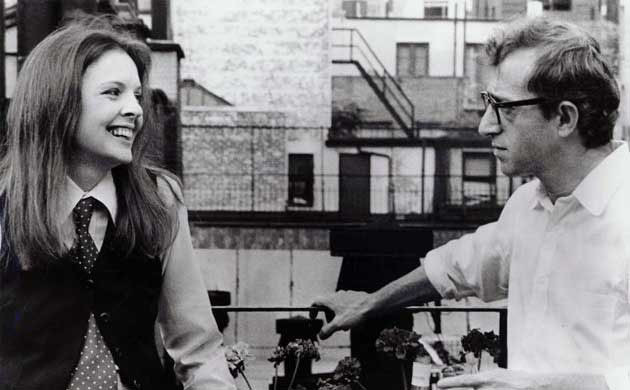The nation’s pop culture writers are currently taking note of the 40th anniversary of “Annie Hall,” thus reminding us of a time when Woody Allen made us laugh without restraint over his jokes instead of cringing a little over his personal life.
Allen took the image of the wimp, the schlemiel, the victim – the brainy kid who kept getting beat up on the playground – who grew up and turned that image on its head. He showed us you could look like him and still get the girl if you were smart and funny enough to wisecrack about all of your flaws instead of trying to hide them.
Suddenly, weakness was a strength! What a concept! What liberation! Woody made it cool to be klutzy.
He made audiences laugh at his neuroses, his scrawniness, his sexual frustrations, his clumsiness, conditions considered so classically Jewish (by some) that he might have been a miracle child conceived one riotous night by a gathering of Philip Roth, Bruce Jay Friedman and Jules Feiffer.
To write about him now isn’t to relegate him strictly into the past tense – after all, he’s still creating movies – but to recognize that it was a different Woody Allen back then. “Annie Hall,” with its Academy Awards and enormous cultural reverberations, was Woody at the peak of his mass appeal, poking fun at Hollywood and New York, at Norman Rockwell gentiles and culturally anxious Jews and any other “transplendent” religions.
“Don’t you see?” he asks fellow New Yorker Tony Roberts in “Annie Hall.” “The rest of the country looks upon New York like we’re left-wing communist, Jewish, homosexual pornographers. I think of us that way, sometimes, and I live here.”
Woody never joked about mothers-in-law or Las Vegas. That was stuff for the old guard of comedians taking their last licks on Ed Sullivan’s stage on Sunday nights. Woody invoked Freud and Kafka and sexual anxieties once considered too delicate to mention in public.
“You’re very good,” a bedmate in “Love and Death” tells him.
“Well, I practice a lot,” he replies, “when I’m alone.”
In “Play It Again, Sam,” he asks a girl, “What are you doing Saturday night?”
“Committing suicide,” she says.
“What about Friday?” he replies.
In “Manhattan,” he laments, “I’ve never had a relationship that’s lasted longer than the one between Hitler and Eva Braun.”
While you were laughing, you could congratulate yourself on getting the cultural references. He made you feel smarter for catching on.
The anniversary of “Annie Hall” – and of that big warehouse of Woody Allen comedies that surrounded it some decades ago – reminds us of the guy who once showed us you could laugh and think at the same time. And of the fellow who turned anxiety into absolute belly laughs.
Top photo: “Annie Hall” movie image courtesy of meldelilaha on Flickr
 A former Baltimore Sun columnist and WJZ-TV commentator, Michael Olesker is the author of six books, most recently “Front Stoops in the Fifties: Baltimore Legends Come of Age” (Johns Hopkins University Press).
A former Baltimore Sun columnist and WJZ-TV commentator, Michael Olesker is the author of six books, most recently “Front Stoops in the Fifties: Baltimore Legends Come of Age” (Johns Hopkins University Press).





